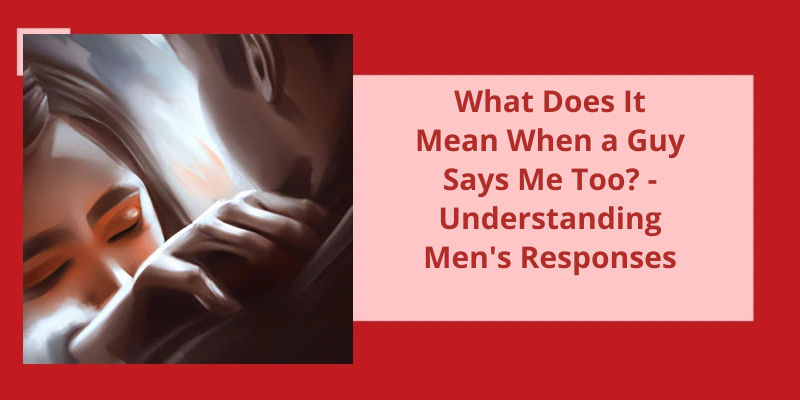When it comes to communication, deciphering what people really mean can be a tricky task. In particular, when someone says "me too," it can leave you wondering what they really mean by it. If you're a woman, hearing a guy say "me too" may leave you questioning if he's interested in you or trying to show empathy towards you. On the other hand, if you're a man, saying "me too" to a woman can convey different meanings depending on the context of the conversation.
What Does It Mean if Someone Says Me Too When You Say I Love You?
When someone says “I love you”, it’s often met with a response like “me too”. This can create confusion as to what exactly the person means by their response. Many people interpret “me too” as meaning “I love you too” or “I feel the same way”. This may seem like a strange response, but it’s actually rooted in a psychological concept known as self-love.
Self-love is the appreciation and acceptance of oneself. It’s the idea that we should treat ourselves with the same kindness, respect, and compassion that we show to others. In other words, they may be saying that they love and appreciate themselves in the same way that the person loves and appreciates them.
It may be a reflection of someones sense of self-love, or it may simply be a way of expressing agreement and affection. Regardless of the exact meaning, it’s important to communicate openly and honestly in relationships in order to ensure that both parties understand each others feelings and needs.
It’s important to not make any assumptions and communicate clearly to ensure that there are no misunderstandings. The meaning of “me too” can vary depending on the individual and the context, so it’s important to not take it at face value and instead try to understand the deeper meaning behind the statement. Ultimately, the best way to truly understand someones feelings is to have an open and honest conversation.
Understanding the subtle nuances of language can be tricky, especially when it comes to common phrases like “you too” and “me too.” While they may seem interchangeable, there’s a subtle difference between the two that can be important to understand in social situations.
What Is the Difference Between You Too and Me Too?
The difference between “you too” and “me too” lies in their usage and context. For example, if someone says “Have a good day!” to you, you might respond with “You too”, indicating that you hope they’ve a good day as well. On the other hand, if someone says “I love pizza”, you might respond with “Me too”, indicating that you also share their love for pizza.
It’s worth noting that the phrases “you too” and “me too” are often used interchangeably in casual conversation, but in more formal or professional settings, it’s generally better to use the full phrase, “Im glad to meet you too”. This is especially true if youre meeting someone for the first time or in a professional context, as it demonstrates respect and courtesy.
This subtle difference in pronunciation can change the meaning of the phrase, conveying different levels of enthusiasm or agreement.
Some people might prefer to be more formal in their language usage, while others might opt for a more casual approach. As long as the intention behind the response is clear and respectful, either phrase can be an appropriate and effective way to communicate agreement or reciprocity.
Ultimately, the choice between the two depends on personal style and context.
Source: Me too vs You too – English Language Learners Stack Exchange
Now that we’ve a clear definition of “me-too” in slang, let’s explore the origins and implications of this term. The use of this phrase has become increasingly popular in recent years, particularly in discussions surrounding social media and cultural trends. It can refer to anything from copying an outfit worn by a celebrity to adopting particular beliefs or political stances simply because they’re trendy. Though the term is often used in a lighthearted or non-threatening way, there can be deeper implications of this behavior that are worth considering.
What Does Me Too Mean in Slang?
Me Too is a phrase that’s become a popular way of expressing agreement or solidarity with someone elses experience or statement. In slang, however, Me Too has taken on a different meaning. As a noun, a Me Too refers to a person who does something simply because someone else has done it before them, often without much thought or consideration. This can refer to anything from fashion choices to personal decisions or actions.
The Me Too phenomenon has become particularly prevalent in todays social media-driven culture, where people are constantly bombarded with images and messages from others. With so much pressure to fit in and conform to societys expectations, many people feel the need to adopt certain behaviors or attitudes simply because they see others doing so. In some cases, this can lead to a lack of individuality and a sense of being lost in the crowd.
While there’s nothing inherently wrong with following in the footsteps of others, the concept of the Me Too can carry negative connotations. It can suggest a lack of independent thought or decision-making skills, and can be seen as a sign of weakness or insecurity. Additionally, blindly copying someone elses actions or choices can lead to negative consequences, such as bad fashion choices or poor life decisions.
Despite it’s negative associations, the Me Too phenomenon has some positive aspects as well. It can be a way to show support for others and to build a sense of community and belonging. By sharing experiences or adopting certain behaviors together, people can connect with each other on a deeper level and find common ground. Additionally, the Me Too can sometimes be a way to break down social barriers and challenge traditional norms, as individuals band together to challenge societal conventions or expectations.
As with any trend or behavior, it’s important to weigh the potential pros and cons and make decisions based on ones own values and beliefs, rather than blindly following the crowd.
Examples of How the “Me Too” Slang Term Is Used in Everyday Conversations
- Friend 1: “I was walking home last night and this guy just wouldn’t leave me alone.” Friend 2: “Ugh, that’s so annoying. Me too.”
- Co-worker 1: “I hate when the boss takes all the credit for something we worked on as a team.” Co-worker 2: “Me too. It’s not fair.”
- Relative 1: “I can’t stand it when people make offensive jokes and act like it’s no big deal.” Relative 2: “Me too. It’s disrespectful.”
- Classmate 1: “I’m so tired of hearing people tell me what I can and can’t wear.” Classmate 2: “Me too. It’s none of their business.”
However, it’s important to consider that “me too” could also have a deeper meaning and may not simply be a response to your affection. It’s important to communicate openly and honestly with your partner to ensure that you both understand and respect each other’s feelings. Let’s explore this concept further and delve deeper into the potential meanings behind a “me too” response.
What Does It Mean When She Says Me Too?
Sometimes when someone says “me too,” they might actually mean it in a genuine way. For example, if you tell your significant other that you love them and they respond with “me too,” they might truly feel the same way. It’s important to make sure that youre communicating in a clear and honest way with them so that you can properly gauge whether or not theyre being sincere. It’s also important to remember that not everyone expresses their feelings in the same way, so it’s possible that they might just have a different way of saying things.
Another way to approach someone saying “me too” is to focus on initiating more meaningful conversations. Sometimes people might not know how to express their feelings, but if you take the time to talk to them and discuss your own feelings, it can help them understand how to express themselves better. Communication is key in any relationship, and it’s important to make an effort to understand where your partner is coming from.
It’s important to approach these situations with empathy and understanding, and to communicate openly with your partner about how you feel. If you want to make sure that your partner is more comfortable expressing their own feelings, it’s important to create a safe and supportive environment where they feel able to open up to you. Remember that everyone expresses their emotions in their own way, and with enough patience and understanding, you can work together to build a deeper and more meaningful emotional connection.
Conclusion
It can indicate that he shares a similar experience as the person talking or that he agrees with the statement made. However, it could also be a subtle way of expressing his interest in the person or an attempt to establish a connection. It's crucial to pay attention to the tone and body language during the conversation to discern the intended meaning. Effective communication is paramount in any relationship, and it's essential to clarify any misunderstandings to avoid confusion and potential issues. Ultimately, understanding the nuances of communication is an ongoing process that requires patience, empathy, and an open mind.






